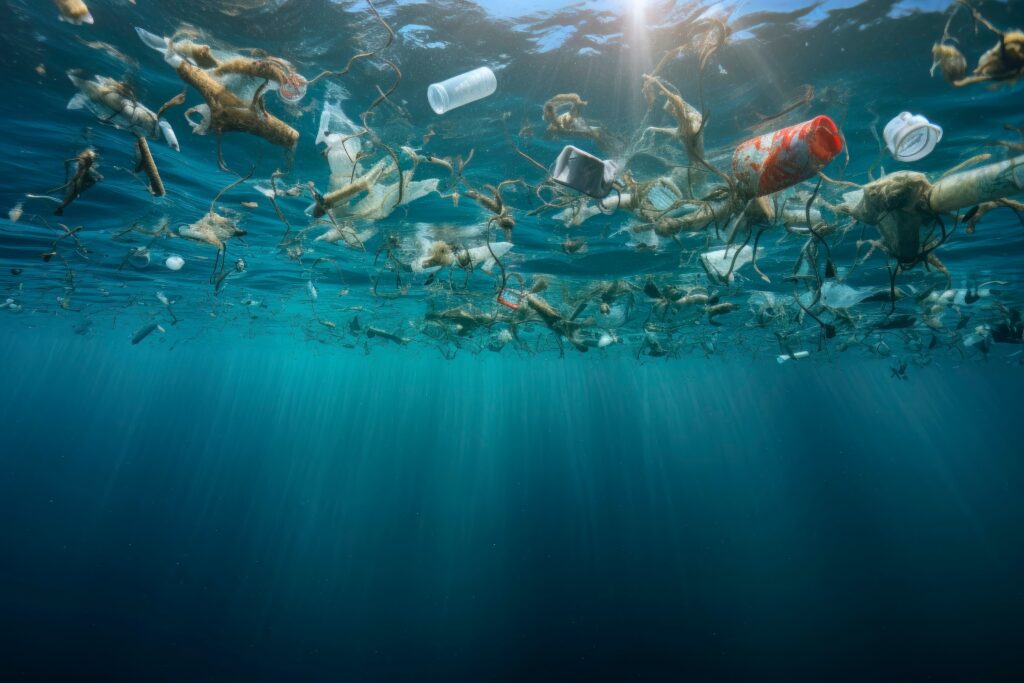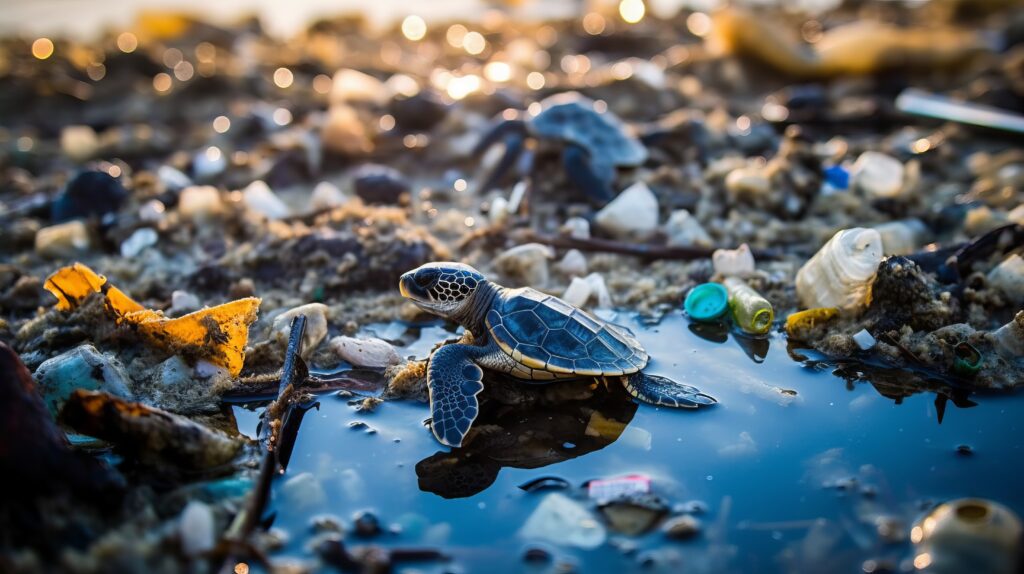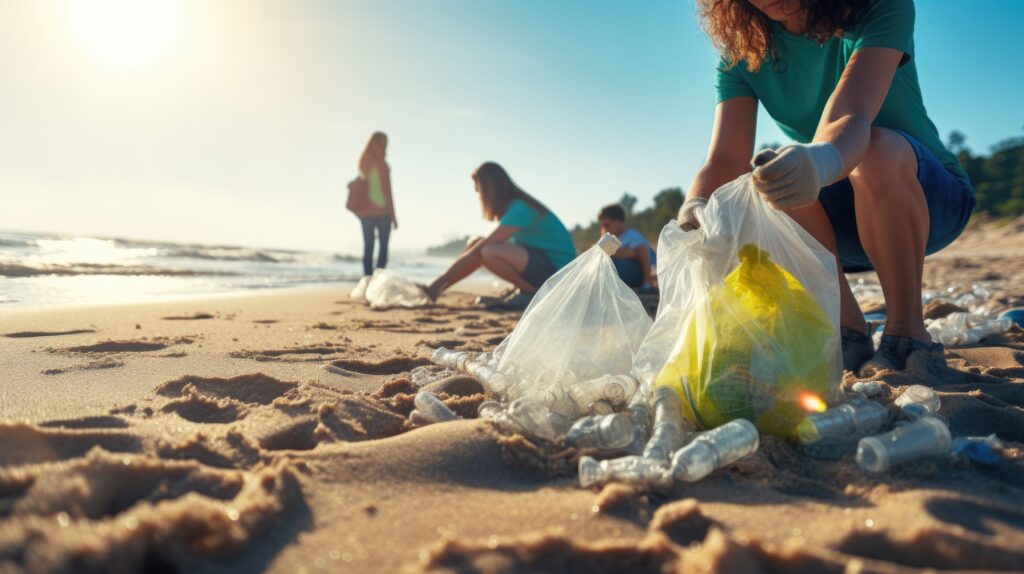
Plastic pollution in the ocean is at its worst worldwide, to the extent that almost all marine life is affected by this wave of detritus. Let's take a look back at the origins of this crisis, and the solutions available to take action.
Plastic pollution of the oceans: a catastrophe in the making

When plastic was invented in the 19th century, it represented a minor revolution. Strong, flexible and inexpensive, it had many advantages. Many different types of plastic were quickly developed, including PVC and bakelite. As new plastics were developed, more and more manufacturers adopted it.
What's worrying about this growth is that it's exponential: it's estimated that over half of all plastics ever made have been produced in the last 20 years. One of the reasons for this increase is the explosion in single-use plastics, such as plastic bags, plastic cutlery, shower gel and shampoo bottles, food packaging and water bottles. Over half of the 380 million tonnes of plastics produced annually are single-use.
Yet only 9% of all plastics produced end up being recycled. As a result, a large proportion of plastic ends up in nature, and almost no natural areas are preserved. In May 2023, a mountaineer even extracted 1.6 tonnes of plastic from the Himalayas!
But the environments most affected are not the high peaks, forests or even cities, but the oceans. Plastic pollution of the oceans affects every body of water on the planet, without exception. Currents tend to bring together floating plastic products, and have thus formed 5 different giant plastic clusters in the oceans, located in the South Atlantic, North Atlantic, Indian Ocean, South Pacific and the largest: the North Pacific. The latter, named by scientists as the "Great North Pacific Garbage Vortex", is made up of 80,000 tonnes of waste, spread over an area of 1.6 million km2! If it were a country, the plastic continent would rank among the 20 largest in the world!
In addition to plastic objects of all kinds, microplastics are an even greater threat. In total, there are over 5,000 billion plastic particles floating in the world's seas. The problem: these microplastics are ingested by many marine species, damaging their health. In turn, we ingest many of the particles resulting from plastic pollution of the oceans, particularly when we consume seafood.
The Mediterranean Sea is becoming the figurehead, holding the sad record of being the most polluted sea in the world. According to the WWF, however, it represents a livelihood for 150 million people, not to mention its vital importance to our food self-sufficiency. Given the alarming levels of plastic pollution in the oceans, it is essential to take action.
Solutions to put an end to ocean plastic pollution

Everyone can do their bit to reduce plastic pollution in the oceans.
Reduce plastic consumption to a minimum
The most important thing we can do to combat plastic pollution of the oceans is to reduce our use of plastic as much as possible. Many everyday plastic objects, especially single-use plastics, can easily be eliminated from our lives without any difficulty. Plastic bottles, for example, should be banished in favor of water bottles. Cosmetics packaging (shower gels, creams, etc.) can easily be replaced by solid or refillable products. Food packaging, which accounts for 40% of the plastic produced worldwide each year, can be easily eliminated by using local producers at markets or bulk grocery stores. Textile-related plastics can also be eliminated from our lives by using noble materials. To find responsible clothing brands, you can rely on eco-labels.
Give each of your objects a long life
Adopting ecological habits also means rethinking our real needs, and correcting our inclination to consume, often to excess. We need to limit our purchases to the strict minimum, so as not to feed a society where our goods become obsolete too quickly. To do this, try to extend the life of your objects as much as possible. For your clothes, you can patch them, send them to the dry cleaners, or why not dye them with natural pigments when you tire of them. This kind of consumption should apply to all your objects: kitchen utensils, furniture, office supplies, electronic devices... When it's unavoidable to part with your objects, sell or donate them. In addition to combating plastic pollution of the oceans, rethinking your consumption habits also helps to reduce your carbon footprint, by avoiding the transport associated with over-consumption.
Recycle
Despite our best efforts, plastic waste is sometimes difficult to avoid. When this is the case, recycling is a necessity to combat plastic pollution of the oceans. It also contributes to the government's target of 100% recycled plastic.
Picking up plastic waste along the way
In our daily lives, we are all confronted with plastic waste, whether in the city or in nature. When blown by the wind, this detritus often ends up in the oceans. So when we come across plastic waste, we have the opportunity, through a simple gesture, to prevent it from contributing to pollution. Picking up the garbage you come across in your daily life, and putting it in a sorting garbage can, is a civic gesture with far-reaching consequences. To do this, always bring a reusable bag and a pair of gloves.
Support associations
To go even further in the fight against plastic pollution in the oceans, there's nothing like supporting the associations involved. One in particular has made it its mission: the NGO The Sea Cleaners. In addition to numerous awareness-raising campaigns and studies on the subject to put pressure on political systems, the association takes direct action by cleaning up the oceans. Thanks to its fleet of boats, it cleans the oceans, seas, mangroves, reefs and other sensitive maritime areas. What's more, the association even cleans freshwater rivers, to prevent the waste they carry from ending up in the ocean.
There are two ways to help The Sea Cleaners in its fight: make a donation or become a volunteer. Being a volunteer can involve a variety of actions, from public awareness campaigns on the importance of reducing plastic consumption, to clean-up marches on beaches, streets and other sensitive areas.
WWF is also heavily involved in the fight against ocean plastic pollution. The internationally-renowned NGO carries out a wide range of field studies and lobbies politicians and industrialists, seeking to ban or limit plastic production locally, and to propose alternative solutions. More broadly, WWF has a number of other programs, such as the fight to save coral reefs. So, on a larger scale, becoming a donor to the association helps toimprove its ecological impact.
More locally, the Clean Walk platform enables you to reference citizen clean-up actions in your area. The aim is to collect garbage in natural environments: beaches, streets, forests, mountains, parks, roadsides... It's a concrete and simple way of preventing garbage from ending up in the ocean.


